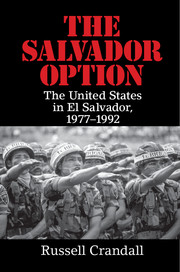Book contents
- Frontmatter
- Dedication
- Epigraph
- Contents
- List of Figures
- List of Organizations
- Acknowledgments
- 1 Introduction
- PART ONE EL SALVADOR IN THE COLD WAR
- PART TWO JIMMY CARTER
- PART THREE RONALD REAGAN
- 19 Reagan Arrives
- 20 Reagan and Salvador
- 21 El Mozote
- 22 Another Vietnam
- 23 Solidarity
- 24 Troop Cap and Certifying Human Rights
- 25 Reagan Gambles on Elections, 1982
- 26 The Shultz Doctrine
- 27 Human Rights
- 28 Henry Kissinger
- 29 Contras
- 30 “Elections Yes, Dialogue No,” 1984 Presidential Election
- 31 La Palma
- 32 Esquipulas
- 33 Counterinsurgency I
- 34 Counterinsurgency II
- 35 Zona Rosa
- 36 Air War
- 37 José Napoleón Duarte
- 38 Iran-Contra
- PART FOUR GEORGE H. W. BUSH
- PART FIVE POSTWAR
- Notes
- Bibliography
- Index
23 - Solidarity
from PART THREE - RONALD REAGAN
Published online by Cambridge University Press: 05 June 2016
- Frontmatter
- Dedication
- Epigraph
- Contents
- List of Figures
- List of Organizations
- Acknowledgments
- 1 Introduction
- PART ONE EL SALVADOR IN THE COLD WAR
- PART TWO JIMMY CARTER
- PART THREE RONALD REAGAN
- 19 Reagan Arrives
- 20 Reagan and Salvador
- 21 El Mozote
- 22 Another Vietnam
- 23 Solidarity
- 24 Troop Cap and Certifying Human Rights
- 25 Reagan Gambles on Elections, 1982
- 26 The Shultz Doctrine
- 27 Human Rights
- 28 Henry Kissinger
- 29 Contras
- 30 “Elections Yes, Dialogue No,” 1984 Presidential Election
- 31 La Palma
- 32 Esquipulas
- 33 Counterinsurgency I
- 34 Counterinsurgency II
- 35 Zona Rosa
- 36 Air War
- 37 José Napoleón Duarte
- 38 Iran-Contra
- PART FOUR GEORGE H. W. BUSH
- PART FIVE POSTWAR
- Notes
- Bibliography
- Index
Summary
The FMLN of El Salvador is a people's army comprised of campesinos, workers, students, teachers, and professionals. The success of the FMLN can only be explained by one thing: the massive and continued support of the population.
– From a flyer announcing a 1981 protest at the White House, organized by the Committee in Solidarity with the People of El Salvador (CISPES)There is a well organised support network for the Salvadoran guerrillas; some of its components operate openly, like the “Committee of Solidarity with the Salvadoran People” [CISPES], but most of the activity has been underground.
– Conservative magazine, The Spectator, 1982Unfortunately for El Salvador, the U.S. is likely to continue that war until more people in this country take a strong moral stand against it.
– Letter to the editor, New York Times, by Eric Arnesen, history professor, Yale University, June 27, 1985As we have seen, U.S. involvement in El Salvador created a controversial and polarizing split between those who viewed the commitment as necessary and those who saw it as amoral and ineffectual; this split was further exacerbated with the assumption that a deeper involvement in El Salvador was inevitable. One less studied story of the Salvador Option is the role that “solidarity groups” – most saliently in the United States – played in influencing both the perception of what was occurring in El Salvador and how Washington should respond. Not surprisingly, many of the American activists opposing U.S. policies in El Salvador concluded from the Vietnam experience that those who spoke up, protested, and even engaged in civil disobedience would be vindicated by what could become an illegal and immoral war. So, in effect, the Vietnam solidarity playbook became the Salvador playbook.
Critics, on the other hand, believed that the lesson from Vietnam was how the North Vietnamese had won the propaganda war in American public opinion. They cited a North Vietnamese cadre who reflected on their efforts to influence the debate in America. “There were, as all political cadre learned by heart, three currents of revolution…in every people's war. The first two currents are the ever-growing international socialist camp and the armed liberation movement within the country in question.
- Type
- Chapter
- Information
- The Salvador OptionThe United States in El Salvador, 1977–1992, pp. 239 - 250Publisher: Cambridge University PressPrint publication year: 2016



